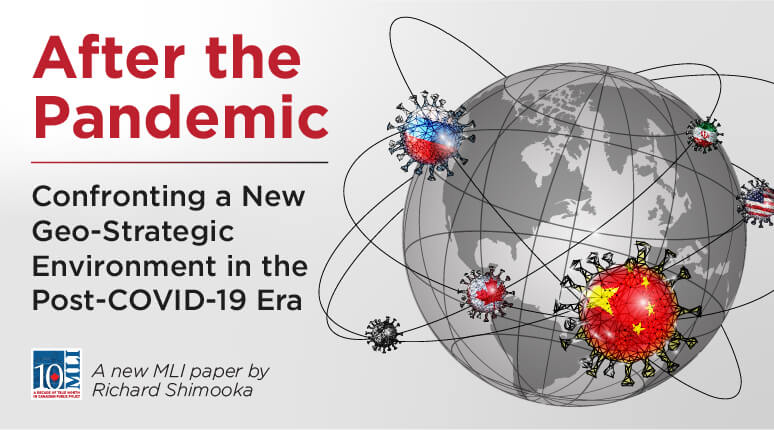OTTAWA, ON (November 10, 2020): The COVID-19 pandemic has already reshaped life for many Canadians. However, the most significant long-term impact of the pandemic will likely be felt less on the personal level, and instead on the global stage.
In MLI’s latest paper titled “After the Pandemic: Confronting a New Geo-Strategic Environment in the Post-COVID-19 Era,” Senior Fellow Richard Shimooka explores how the world’s economic and military landscape is being reshaped by COVID-19.
“The pandemic coincided with a fundamental realignment in defence and foreign relations,” writes Shimooka. He points to a number of examples, including “resurgent nationalism, the rise of China as a major power, and the fraying of Cold War alliances and multilateral organizations.”
Prior to COVID-19, Canada had been a beneficiary of a rules-based international order that helped secure our economic and security interests. That order is now fracturing, facing increasing pressure from revisionist actors such as China and Russia. In this context, Shimooka urges policy-makers to make smarter investments in security, defence, and foreign policy. Failing to do so could greatly diminish the West’s position in the volatile post-COVID world order.
Throughout the paper, Shimooka tracks the recent political, geostrategic, military, and economic trends, setting them in the context of COVID-19. His findings paint a worrisome picture of resurgent authoritarianism globally and a weakening of the West.
Particularly concerning is that the fact that the West is now strapped for cash, at a time when our adversaries are only increasing their ambitions. Massive accumulated debt loads and shifting priorities to mitigate the economic and human costs of COVID-19 have reduced our relative capacity to manage growing foreign policy and defence challenges.
Similarly, Shimooka finds that many Western countries are struggling with internal challenges from populism, nationalism, and anti-democratic forces.
However, it isn’t all bad news. Shimooka notes that the COVID-19 pandemic has, in some ways, led to greater alignment among Western allies, who have sought to depoliticize their international cooperation. With fewer resources and greater shared challenges, increased cooperation is imperative for facing the new and shifting international environment.
Shimooka argues that cooperation and depoliticization are key for middle powers like Canada as they seek to navigate the post-COVID world order. Ottawa can ill afford to be complacent, as it too often is, about its place in the world.
Furthermore, as budget pressures mount, Shimooka urges Western governments to avoid raiding defence budgets in pursuit of austerity. For instance, new approaches and methods of using force have reduced the cost of aggression, all the while countries like China “seem unlikely to curtail [defence] spending significantly… Furthermore, the pandemic has ravaged several already weak economies among developing states, which may require Western states to intervene.”
With the unprecedented scope and effects of COVID-19, it is no surprise that it is fundamentally changing the overall state of international relations. While many trends have changed, Shimooka finds that post-COVID world order is one in which existing trends have intensified.
To learn more about the new geo-strategic environment in the post-COVID era, read the full paper here.
***
Richard Shimooka is a Senior Fellow at the Macdonald-Laurier Institute. He was a Senior Fellow at the Defence Management Studies Programme at Queen’s University from 2007–2012, and a Research Fellow at the Conference of Defence Associations Institute from 2012-2017.
For more information, media are invited to contact:
Brett Byers
Communications and Digital Media Manager
613-482-8327 x105
brett.byers@macdonaldlaurier.ca





